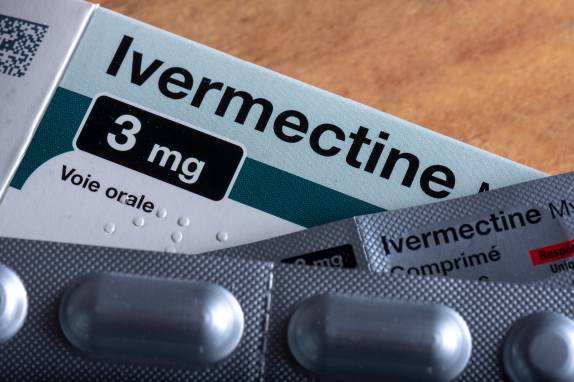Connect with a verified veterinarian in minutes. Licensed vets are available 24/7 to answer your questions. No need to worry about your furry family member.
We’ve received questions about this topic many times, “Can I give horse ivermectin to my dog?” Understandably, some pet parents would believe the horse version of ivermectin is also safe for dogs (we’ll get to that a bit later). However, we have to say that giving your dog (or other pets) meant for other, larger animals is never a good idea.
In this article, we’ll discuss the medication horse ivermectin and how it’s used. We’ll also review whether or not this medication is safe for dogs and more.
What is Horse Ivermectin?
Horse ivermectin is an OTC medication that works as a dewormer in horses. This equine medicine may also be referred to by other names, such as Moxidectin, Milbemycin, Bimectin, heartworm medication, and equine dewormer.
Horse ivermectin medicine is available in different forms but is most often administered as a paste. The dewormer works to kill off various parasites found in the digestive tract, including:
- Large strongyles
- Small strongyles
- Pinworms
- Ascarids
- Hairworms
- Large-mouth stomach worms
- Bots
- Lungworms
- Intestinal threadworms
The paste can also work against skin sores caused by bots and dermatitis caused by neck threadworms. The medication is administered in a syringe containing enough paste to treat a horse weighing about 1,250 lbs. The syringe is placed into the horse’s mouth, and then the medication is squeezed out at the correct dosage.
The most important information about this medication is that equine (horse) ivermectin is made solely to treat horses. Therefore, this medication should not be used to treat dogs, other pets, or humans.
We mention “humans,” as some people believe that horse ivermectin is a safe cure or preventative for Covid-19 in humans. We have to stress that this medication can poison humans.
Isn’t Ivermectin Prescribed for Dogs?
Yes, ivermectin is sometimes prescribed for dogs (and cats). It’s sometimes used to treat parasitic infections (internal and external) and may be used as a heart worm preventative in dogs.
Ivermectin appears to be used as a heart worm preventative in dogs. However, veterinarians sometimes prescribe the medication for “off-label” uses to treat internal and external parasites. The medication is sometimes used to treat mange, for instance. In cats, ivermectin is sometimes prescribed for off-label use to treat ear mites and cat scabies.
There’s nothing wrong if a vet prescribes this medication for off-label use. This is common practice with some types of medications. However, the vet will provide rigorous directions for off-label use. These directions should be precisely followed.
When prescribed for dogs, ivermectin is usually given as tablets, chewable tablets, a topical liquid, or an injectable (provided by the vet). When given as prescribed, this medication is usually effective and safe.
One thing to keep in mind is that the dose for dogs is much smaller than the dose for horses. This is because too much of the medication can poison a dog, while the right amount of ivermectin is relatively safe and effective.
So, dogs can safely take ivermectin. So, what’s the problem with a dog taking equine ivermectin?

Review symptoms, medications & behavior to keep your pets healthy with a Vet Online in just minutes.
Ask a Vet Live NowWhy Can’t Dogs Take Horse Ivermectin?
The problem with a dog taking horse ivermectin is the dosage given. Keep in mind that horses are much larger than dogs! If a horse receives the right dose, he will be OK. However, if a dog takes the same amount of the medication given to the horse, he will become poisoned. That’s because the horse’s dose contains too much medication for the dog.
Many people don’t understand the difference and believe their horse’s medicine is OK for the horse, so it should be OK for the dog. They don’t realize that an ivermectin dose for a dog is much, much less than it is for a horse. This is the problem.
Even one lick of equine ivermectin contains too much medication. One lick is enough to kill some dogs and make others very sick.
Why Would Anyone Give Their Dog Horse Ivermectin?
Some pet parents may have a horse and give the medication to the horse without any problem. Then their dog may develop some symptoms of parasitical infection. They may then choose to give the dog the horse’s medication without a second thought. After all, it saves a trip to the vet and saves money on buying the same medication for the dog.
Another problem is that dogs may accidentally lick up equine ivermectin off the ground or floor. The pet parents may have dosed the horse, and some of the medication dropped to the floor. This is common. Then the dog finds the liquid and is curious. He may then lick up the liquid and become poisoned, just from one drop. This is an accident.
Then there are other types of accidents where the dog may find the medication packaging and lick it, chew it, or even eat it. Dogs are inquisitive and will eat just about anything! If something smells like food, too, dogs will readily scarf it up! In this scenario, the dog may find the discarded ivermectin packaging in the garbage or even find a partial tube of the medication in their pet parent’s truck or in the stable.
There’s another way a dog can become poisoned by equine ivermectin, which is also accidental poisoning. You know that dogs are notorious for eating feces. It’s possible that a dog may eat horse feces and receive an overdose of the medication, leading to poisoning.
These are the most common ways dogs gain access to horse ivermectin.
Some Dog Breeds are More Sensitive to Ivermectin
Some dog breeds are sensitive to ivermectin. If these dogs take the medication, even at the right dose for canines, they can become very sick. The dog breeds most susceptible to this medication include:
- Australian shepherds
- Long-hair whippets
- Collies
- Border collies
- McNabs
- Silken wind hounds
- Shetland sheepdogs
- Old English sheepdog
- German shepherd
- And other herding breeds (and mixed breed dogs that include herding breeds)
These dog breeds all have one thing in common: a genetic mutation that makes their central nervous system more easily affected by toxins. What does this mean? It only takes tiny doses of ivermectin or other medications to poison these dogs.
The mutation is caused by the MDR1 gene. The mutation can make a dog sensitive to other medications, too. And it’s important to understand that not all herding dogs carry this mutation. So, if you want to know if your dog carries this specific mutation, it will be necessary to have your dog tested.
The test for this mutation is easy on your dog. Some cells are scraped from inside the dog’s cheek and then set to a lab to be genetically tested. If you’d like to see if your dog has this mutation, then it’s a good idea to talk with the vet about having your fur baby tested.
What’s more, this same type of sensitivity can be found in other dogs and puppies that have received too much medication.
Ivermectin Toxicity Symptoms in Dogs
You may notice these symptoms if your dog has ingested ivermectin:
- Vomiting
- Dilated pupils
- Loss of appetite
- Lethargy
- Depression
- Excessive drooling
- Disorientation
- Blindness
- Tremors/seizures
- Slow heartbeat
- Breathing difficulties
- Coma
If you notice these symptoms in your dog, then call the vet immediately. This is an emergency. An overdose of ivermectin can cause death in dogs.
Treatment of Ivermectin Toxicity in Dogs
Ivermectin poisoning does not have an antidote. What’s more, the effects of poisoning with this medication cannot be reversed. These are the reasons it’s imperative to call the vet as soon as possible if you know or suspect your dog has ingested equine ivermectin.
When you arrive at the vet, they may treat the dog with activated charcoal. This helps to keep the medication from being absorbed by the dog’s body. Additional treatments may include gastric lavage, which is used to wash the toxin out of the dog’s stomach. This procedure is done with the dog under anesthesia.
Next, the vet may run tests that include some of the following:
- Chemistry tests (to check kidney, liver, and pancreas function and sugar levels)
- CBC (complete blood count to check for any blood issues)
- Electrolyte tests (to ensure the dog isn’t dehydrated and doesn’t have an electrolyte imbalance)
The vet will also provide supportive treatment, which is meant to keep the dog comfortable. They will also treat any other symptoms that may arise.
Overall, the vet’s treatment will be based on the dog’s symptoms. Additional treatment may include an IV for fluids and to administer medications, such as corticosteroids. The vet may also provide some type of nutritional support through a feeding tube. And it may even be necessary to put the dog on a ventilator. They will also work to keep the dog’s body heat normal and control seizures with medication.
A long hospitalization is usually required for dogs poisoned with horse ivermectin. During the first days of treatment, it’s possible that the dog’s health may fail. This is because the toxins are taking effect. However, once stabilized, it’s likely the symptoms may begin to improve.
In many cases, dogs may be kept sedated while they’re hospitalized, especially if they’re placed on a ventilator.
The recovery is very slow for dogs, which means it can take weeks or months for a dog to feel better.
Dogs have the best prognosis when they receive medical treatment soon after ingesting too much ivermectin.
At-Home Recovery for Dogs with Ivermectin Toxicity
When a dog is well enough to leave the vet’s, then they can return home. However, the dog will still require plenty of care as he moves through the recovery period. As noted earlier, it can take weeks and months for a dog’s health to improve.
As the dog recovers at home, it’s imperative to follow the vet’s instructions and guidance strictly. For pet parents who need help or have questions, the vet will definitely be available to help.
What’s more, the vet may want to see your dog at different points during the recovery period. It’s important to attend each of these appointments. This is the best way to ensure the dog is making good progress with his recovery.
Prevention is the Best Medicine
Horse ivermectin poisoning is best treated by taking the right preventive measures. First, of course, we understand that accidents can and will happen. However, doing your best to avoid these accidents may keep your dog alive!
Never give your dog medication meant for another animal. While it seems like the same medicine, horse ivermectin is not meant to be given to dogs. This is a medication made especially for horses, at a dose that’s right for their size.
Next, always discard empty containers of ivermectin properly. Make sure the used containers are thrown away in a dog-safe garbage container.
If the liquid is spilled when giving your horse the medication, then immediately wipe it up. Equine ivermectin is also toxic to other animals, including cats.
And never leave horse ivermectin where a dog may get it. It’s easy to throw the medication into the back of a pickup, into a bag that’s in the car, etc. Make sure to keep the medication in a container the dog can’t get open, such as a metal box.
Summing It Up
Horse ivermectin is perfectly safe to give horses when the medication is given in the right dosage for the horse. However, at the same dose, the same medication can poison and kill a dog within hours. Not only that, but equine ivermectin is also dangerous for other animals, including cats.
Never give your dog horse ivermectin. Only use ivermectin that’s been specially formulated for dogs. And always check with your vet to see if ivermectin is safe for your fur baby.
If your dog accidentally ingests horse ivermectin, then call the vet immediately. Your dog’s life will depend on how soon he receives treatment for horse ivermectin toxicity.
And remember that horse ivermectin is not safe for humans. Taking a horse’s dose of equine ivermectin can lead to poisoning and death in humans, too.
Last of all, if you have any questions about horse ivermectin, we highly recommend contacting your vet. They will have the knowledge and experience needed to provide you with the best answer to your question.
Connect with a verified veterinarian in minutes. Licensed vets are available 24/7 to answer your questions. No need to worry about your furry family member.

Julie
Julie is a graduate of the University of North Carolina, Wilmington, where she studied Animal science. Though contrary to the opinion of her parents she was meant to study pharmacy, but she was in love with animals especially cats. Julie currently works in an animal research institute (NGO) in California and loves spending quality time with her little cat. She has the passion for making research about animals, how they survive, their way of life among others and publishes it. Julie is also happily married with two kids.
Review symptoms, medications & behavior to keep your pets healthy with a Vet Online in just minutes.
Ask a Vet Live Now




